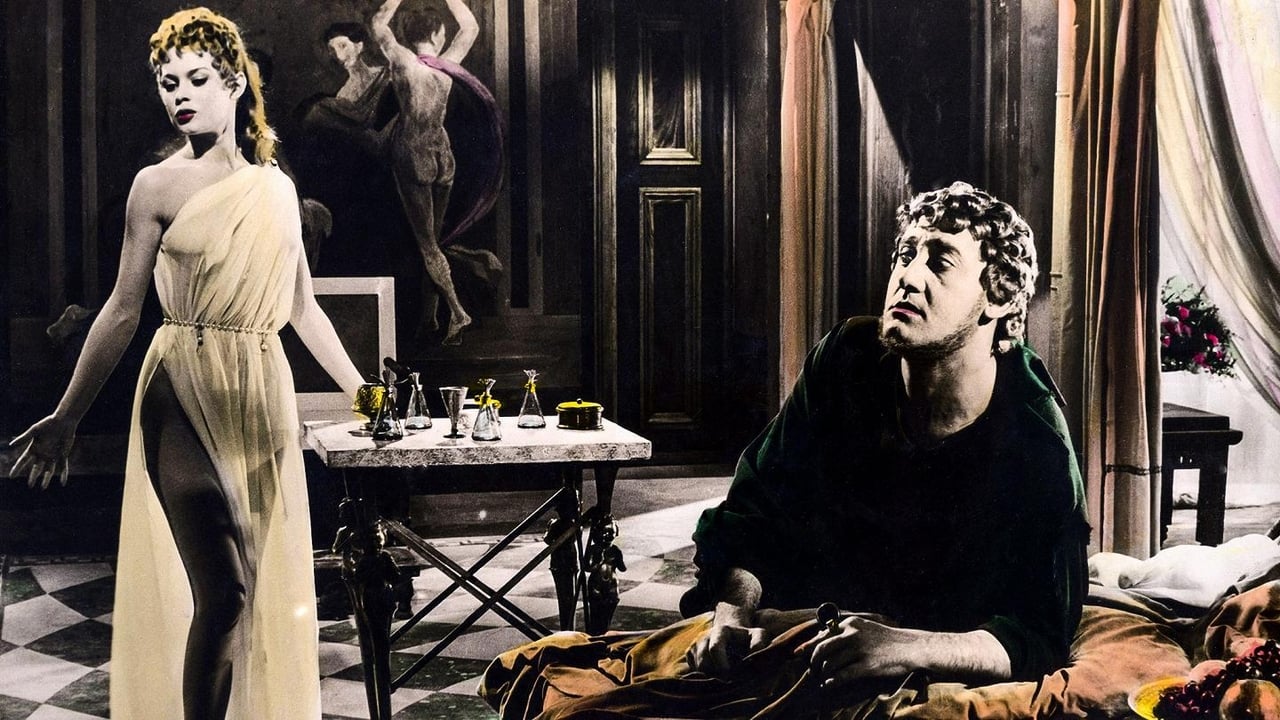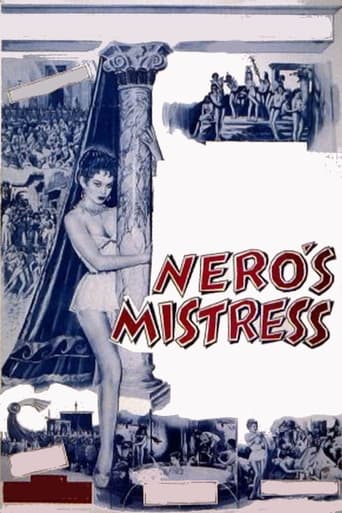

Don't expect to hear the voice of the legendary Gloria Swanson in this farcical view of the last of the original Roman empire dynasty. The Claudians, seriously documented in the brilliant BBC miniseries "I Claudius" gets a follow-up with this Italian farce. If you recall, in the television adaption of Robert Graves' classic novel, Claudius was poisoned by his evil wife, Aggrapina and her son, Nero. Claudius foresaw the end of his family's reign and gladly ate the poisoned mushrooms fed to him by his wife, as evil as any of the women who proceeded her. That's the part Swanson plays, and she's a sight to behold. Alberto Sordi is the frivolous Nero, as mad as his uncle Caligula, cheery but irresponsible, and involved with the beguiling Pompea (Bridgette Bardot) much to his mother's displeasure. I couldn't tell if she was more upset over his putting snakes in her bed (for which she carries a mongoose around) or his choice of bed-mates. This is a bit of a history lesson, mentioning everybody going back to the mother of the nation, Aggrapina's great grandmother, Livia. As they recapped the family history, I couldn't help but laugh in recollection.This certainly is gorgeous to look at, every detail of it as you elaborate as any of the biblical epics Hollywood was doing with extremely high budgets at the same time. However, the acting within the Italian dubbing, I couldn't properly accept as believable for Swanson's character. A lot of the Roman royalty lusts for excesses is right on, and a musical performance by Sordi with fat male children backing him up as chorus boys seems to have influenced the creators of the disastrous "Caligula". It also seems influenced by the many overstuffed operas, although I think this is closer to Mozart's burlesque period than any of the great writers of opera's golden age. I am certainly glad that I sought this out both for the historical view (if not the method in which it was presented) and for Swanson's presence. Call this one, "A Funny Thing Happened on the Way to Rome's Destruction". Or even better, "How to Murder your Mother while she murders your mistress".
... View MoreAs was the case with TWO NIGHTS WITH CLEOPATRA (1953), this Alberto Sordi vehicle lampoons the then-affluent peplum genre; helmed by another comedy specialist, it's a superior effort – with the star's particular brand of fooling (a mix of pompousness and naïveté) somewhat better suited this time around to the requirements of his role, that of notorious music-loving and mad Roman Emperor Nero.Besides, the film has an eclectic – and rather surprising – mix of talents, on both sides of the camera: in fact, it co-stars Vittorio De Sica (a great director but also a wonderful actor) as Seneca, Gloria Swanson (her renowned comeback in SUNSET BOULEVARD [1950], alas, didn't lead to much) as Agrippina – Nero's fearsome and domineering mother, Brigitte Bardot (on the verge of becoming an international sex symbol) as a rather ordinary-looking Poppea, and even future Hammer leading lady Barbara Shelley – though not in a prominent role, presumably, as one of the innumerable maidens at Nero's palace; and, then, there's horrormeisters Mario Bava and Lucio Fulci – here in the capacity of cinematographer and assistant director respectively! The film manages to be quite engaging and stylish (no wonder, given Bava's involvement)…even if it was rather a chore to watch, since the Italian TV channel which showed it has been suffering from a horrendous reception for some time! The simple plot involves Agrippina's unannounced arrival at Nero's resting quarters to verify rumors of his liaison with Poppea; Seneca, Nero's adviser, is assigned by the Emperor the task of stalling her at every turn…even if he has to marry her to do so! Of course, Nero is eager to flaunt his alleged musical genius and the bevy of associates and conspirators enclosed within the palace boldly hisses or meekly applauds his would-be compositions; at the end, distressed by rejection (especially by those closest to him) leads him to set the empire's capital on fire...
... View MoreA very silly movie indeed. A spoof of Nero and ancient Rome. I loved Nero's elegiac song in the palace court, surrounded by the chubbykin cherubs. Nero to mamma Agrippina, "How beautiful you are," he says, as he plans to kill her and others who annoy him or stand in his way in this movie where everybody seems to have homicide on their minds and snakes in their hands. Nero's philosophy: "I have more important things than politics. I have to sing." Seneca turns the criticism of Nero's singing like a dog into a laudatory affirmation. This is all Marx Brothers mayhem, with the weirdest casting imaginable: Alberto Sordi as the demented Nero (perfect), Gloria Swanson as mom Agrippina (seething), Brigitte Bardot as gold-digger Poppea (lusty), Vittorio De Sica as Seneca (cautiously two-faced). The movie's release in America in a dubbed version was minimal, but it's really quite enjoyable.
... View MoreThe epoch of the Roman Empire has inspired many film makers to produce movies set in this age. This is one that'll never be matched. I do not mean that it is of a superb quality, but it stands out as being one of the very few films that make fun of this civilization. The storyline is quite thin - everyone makes his best to stop Nero from singing. Everyone tries to kill everyone: Nero tries to kill his mother Agrippina, Agrippina tries to kill Seneca and Poppea, these two in turn try to kill her too. Agrippina's trials always fail to work - the others' though, work every time. They put vipers in her bed, they give her poison to drink, they drop ceilings on her bed, they flood the ship on which she is travelling. But each time she always appears back as a demon from hell unable to die. Her appearance after each attempt is ghastly, especially the one after Nero orders her ship to be drowned - she appears in the palace dresses in a pale blue dress with lightning flashing behind her. Gloria Swanson is just about the best thing is this film. Her acting is superb as the plotting mother of the mad emperor. The charm she had in the 1920s is still present as late as 1956. Alberto Sordi is fine as the childish mad emperor, Vittorio de Sica is funny as the all-sapient Seneca while Brigitte Bardot fits excellently as the bitchy, wealth-seeking Poppea. All in all it is a fine comedy set in ancient times, bound to be enjoyed by those who watch it.
... View More